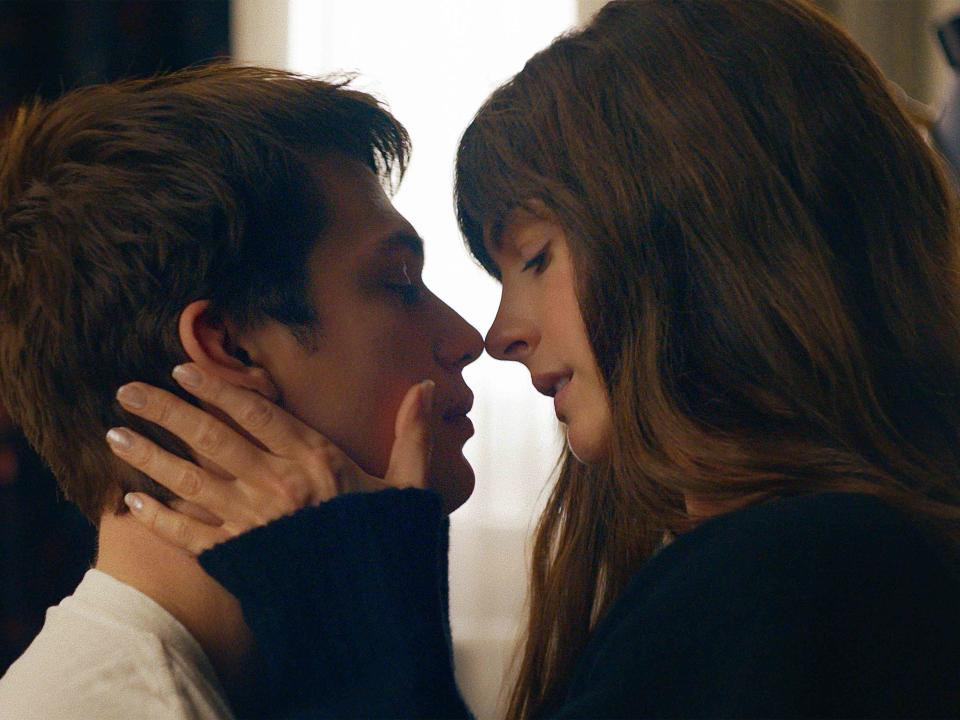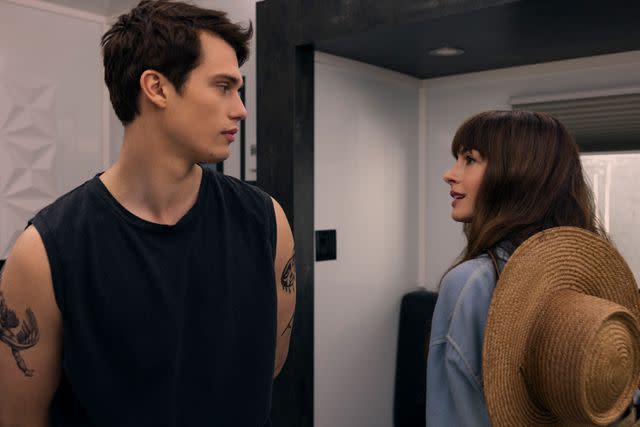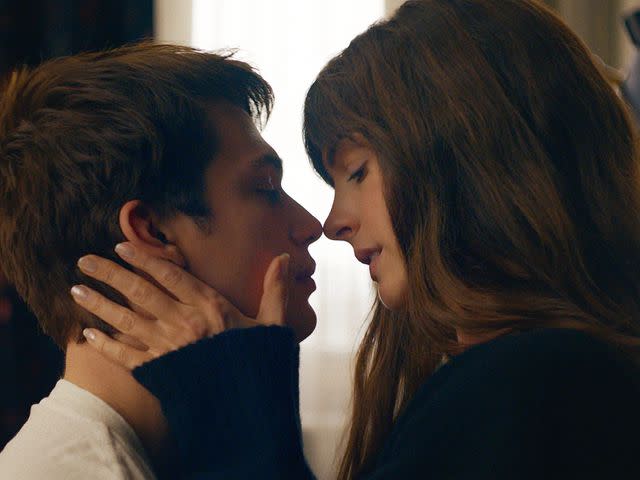'The Idea of You' Lets Moms Have Hot Sex and Get Away With It...Almost
Society expects mothers to be asexual. Anne Hathaway's new rom-com subverts that notion—but is it satisfying?

Amazon Prime
Are mothers allowed to prioritize themselves? Can they have their own identities beyond a selfless madonna dedicating her whole life to her children? Are they—gasp—allowed to have hot sex and orgasm first? So asks Anne Hathaway’s new romantic comedy, The Idea of You.
The film, which premieres May 2 on Amazon Prime and is based on Robinne Lee’s best-selling novel of the same name, focuses on 40-year-old single mom Solène (Hathaway), who falls in love with Hayes (Nicholas Galitzine), a 24-year-old lead singer in a world famous boy band. The two flirt a bit, building sexual tension until Hayes and Solène are frolicking around the globe in a worldwide musical and sex-infused tour. (The much-buzzed-about sex scenes are hotter than a ‘90s rom-com, but not quite Bridgerton-level, so moderate your expectations.) They keep their love life mostly under wraps, save for some beachside and romantic restaurant canoodling. Inevitably, when their relationship is discovered by Hayes’s legion of fans and the rest of society, Solène is castigated, targeted for being the mother of a teenage daughter.
“Sleaziest mom of the year?” blasts one headline, alongside photos of Solène in a bikini kissing a shirtless Hayes. “Aren’t u somebodys mother? Act like it!” snarks one commenter while another spits, “If u were my mom id crawl into a hole.”
In one scene, Solène confides to her best friend Tracy that she’s shaken by the visceral hate slung in her direction. “I didn’t know my being happy would piss so many people off,” Solène says. “Oh, right, did I not warn you?” Tracy responds. “People hate happy women.”

Amazon Prime
It’s a storyline that’s all too familiar, playing out frequently in real life—the bitter hatred aimed at Olivia Wilde during her relationship with Harry Styles comes to mind. (Styles served as partial inspiration for Hayes, in fact.) And it’s not solely about hating happy women; it’s about hating mothers who deign to let their identity be more than just “caretaker.”
Producer Cathy Schulman says that the fact that The Idea of You touched on these topics is what drew her to the book in the first place, and why she fought to make it a movie. She liked that Solène, a recent divorcee with a successful career, begins prioritizing her sensual needs. It challenges the fundamental notion that “the moment that you give birth to a baby, your sexuality has to die on a vine,” Schulman tells InStyle.
“It’s the consistent desire to compartmentalize women,” Schulman says of the angry comments in the film. “God forbid that you check more than one compartment at any given time, this anger seems to rise. There’s this huge cultural pressure that makes women feel guilty for looking to live out their sexual desires once they’re mothers and that’s really a bizarre double standard when you consider that nobody would ever consider that necessary for fathers.”
The film repeatedly points to this double standard—multiple characters bring it up, including Solène’s ex-husband’s new young girlfriend, who acknowledges his “stunning hypocrisy” when he berates Solène.
Hathaway’s own familiarity with online hatred helped inform the character. “From personal experience, I knew that everything we were saying was true,” she said in an interview with The New York Times. Hathaway, like Schulman, was drawn to the film because of how it shows Solène giving herself full permission “to explore aspects of herself as a person” beyond her career and motherhood. And, Hathaway is at a stage in her life where she is “ready to be a sexual creature out loud,” as she told Vanity Fair. “It’s not like one healthy, consensual female orgasm (okay, multiple) is going to change the world. But I’m really happy to be part of a story that takes pleasure in female pleasure.”

This expectation that society imposes on mothers—be completely selfless; you are a mother first and your own person second—permeates our culture. And these perceptions can have very real, very dangerous consequences: When the Supreme Court recently heard arguments in a case that will determine how close to death a pregnant person needs to be in order to receive abortion care, Justice Samuel Alito sparred with Solicitor General Elizabeth Prelogar about whether hospital doctors need to treat both a pregnant woman and her “unborn child” as equal patients. Abortion advocates worry this could spur fetal personhood arguments, implying that a nonviable fetus’ needs could supersede those of a pregnant person’s. When we prioritize the act of someone being a mother over their own individual needs, it's a slippery slope.
Feminist scholar Andrea O'Reilly, Ph.D., who has been studying motherhood and mothering for 35 years, describes these societal pressures and the concept of the ideal mother: “If you’re a good mother, your children come first, you’re all-giving, you’re altruistic,” explains O'Reilly, a professor at York University in Toronto. “But what’s really central to all of that, which isn’t talked about as much, is mothers are also supposed to be asexual.”
O'Reilly says that if a mother is expected to have no needs of her own, and sexuality is about her needs, then it’s counterintuitive for the ideal mother to be sexual. The concepts “cancel each other out.”
"If a mother is expected to have no needs of her own, and sexuality is about her needs, then it’s counterintuitive for the ideal mother to be sexual."
She recalls the uproar around Maggie Gyllenhaal’s 2021 film, The Lost Daughter. In the film Leda (Olivia Coleman) tells Nina (Dakota Johnson) that when her children were 5 and 7 years old, she left them and didn’t see them for three years. “What did it feel like without them?” Nina asks. “It felt amazing,” Leda replies.
“It was like a firestorm,” O'Reilly recounts, speaking about the film’s reception. “People were losing it right, left, and center because she left her children to pursue her sexuality, her scholarship, to create a life outside of motherhood. And that’s still heresy today. Father’s leave every other day, but a mother leaving is blasphemy.”
Reactions to motherhood and sexuality in literature and onscreen are a reflection of how women are treated in reality. In January, Molly Roden Winter published her best-selling memoir More, about her experience opening up her marriage and becoming polyamorous. “A big reason why I wrote the book is because there has been polyamory in the zeitgeist, but not mothers who are polyamorous,” says Winter, who has two sons. “My story was something that I wanted to share, because of the way in which we don’t allow mothers to be sexual. It’s something that I have felt even in my most liberal enclave of Park Slope, Brooklyn. It’s still very shamed, and a lot of people can’t wrap their heads around it.”
Cautionary tales exist everywhere, with women told that if they step out of the restraints society has imposed, there will be punishment. And that punishment can range from public outrage to the threat of their children being taken away. “That isn’t just an empty threat,” says O'Reilly. “We certainly know women who’ve lost custody, particularly queer mothers.”
While any mother might be condemned for acting on her desires, marginalized groups receive harsher criticism. “Black mothers often face heightened scrutiny regarding sexual behavior, and are more quickly labeled as bad mothers,” explains Maki Motapanyane, Ph.D., chair of the department of women’s studies at Mount Saint Vincent University in Halifax, Nova Scotia. As a response to this, Motapanyane says some people in Black communities might try to counteract negative stereotypes by emphasizing a rigid morality. “This can burden Black mothers to conform to inflexible standards of behavior constraining the expression of sexuality.”
In fact, O'Reilly argues, the only mothers allowed to have even a sliver of sex lives are straight, cisgender, attractive, feminine white women. Society will open the door a little to push motherhood boundaries, but only in a very controlled way.

The Idea of You's film ending is different than the book's—one example of this controlled shift. Lee’s original conclusion didn’t sit well with a lot of readers (a mom friend recommended the book to me with the caveat: “You’re going to hate the ending.”) The film adds a scene that is far more hopeful for Solène and Hayes.
Schulman says it was a big decision to change the ending, but adds that it was something she thought about from when she first optioned the book. She and the screenwriters were conscious of what the message of the movie needed to send.
“Solène’s character had to balance the various elements, mostly negativity, from the outside world enough to keep her child safe,” says Schulman, referring to Solène’s daughter Izzy being hounded by paparazzi and teased at school. “But once that was secure, she had every right to pursue her own happiness on behalf of happiness for the whole family. We really wanted to allow that to be a possibility for her future as a character. Rather than end tragically, that society could win, I would rather that the human spirit did.”

Amazon Prime
I tell O'Reilly about The Idea of You and the film's adjusted ending. But when I try to explain how the movie managed to balance prioritizing Izzy’s safety, while giving Solène hope, O'Reilly is not satisfied. She is especially disappointed to learn that Izzy turns 17 in the film (versus 13 in the book).
“They made maternal sexuality more palatable, but it’s still mitigating the message,” she says, because it both ages Solène’s daughter and jumps to a time when she is no longer living in the house with her. “It’s saying you can be sexual, but only under these conditions.” O'Reilly adds that she finds the revisions “quite clever”—while the movie is being taboo and subversive by pairing a mother with a public-facing younger man, it is also being normative and safe. Solène keeps her “good mother” image in the end, but is only given a chance at full happiness once she is no longer “actively mothering.”
It’s hard to know how people would have reacted to an even bigger shift away from the book’s ending, but it also doesn’t seem realistic that Solène would let her daughter be miserable just to keep her love interest. That wouldn’t have felt comfortable either…which is entirely the point.
"Is not being disappointed the same thing as being satisfied?"
Since publishing her memoir, Winter has tried to avoid reading comments on articles about it—although it’s hard to completely avoid the criticism people direct her way for being so open about her sex life while also being a mother. (The book begins when her sons were 3 and 6 years old).
“Just the idea of wanting something outside of motherhood and marriage is threatening somehow to the status quo,” says Winter. She says she suspects that people are negative toward her because she is challenging the patriarchal idea that women are just sexual objects, when in fact they are sexual subjects who have desires of their own.
Winter remembers people in her life expressing concern about her children once her older son found out she and her husband were polyamorous. It wasn’t necessary for anyone to be concerned. “My mom-self was still highly functional,” she says. If anything, Winter wants to positively model to her sons that a woman’s identity doesn’t cease to exist once she has children, that we don’t need to act in deference “to this idealized bullshit notion of what children need mothers to be.”
“Motherhood is just part of who I am, it’s not the entirety of who I am,” she says. Winter admits that she did take into account her son’s ages when timing the publication of her book. “It was important to me that I wait until my youngest was an actual adult,” says Winter. Her sons are now 19 and 22, but she still has people asking if she’s worried about the effect the book’s attention will have on her children. “At what point are you allowed to not be worried about how your life impacts your children? At what age do you get to be a whole person?” says Winter. “And the answer, for some people, is never.”

When I started working on this piece, I thought it would be all about how the reworked conclusion (which gives Solène and Hayes an almost-happy ending) is a feminist success. After all, by casting Hathaway—living her best life as a 41-year-old mom of two—it’s a wink at her own triumph over the internet’s scorn. By the last few minutes of the movie, I was almost holding my breath, not so much happy as relieved.
But is not being disappointed the same thing as being satisfied? Are we conditioned to settle for breadcrumbs because culture is so misogynistic, we don’t dare demand more?

Amazon Prime
In her NYT interview, Hathaway said she related to the fact that Solène used to be a people pleaser. The truth is, Hollywood has a profit incentive, and so popular films are also—by virtue of trying to make as much money as possible—people pleasers. Of course, mainstream films are going to play to the middle ground. But then let’s not praise a film as upending the patriarchy, when it is merely poking it. Shonda Rhimes recently said something similar regarding Barbie: “There was nothing wrong with the movie; I thought it was totally delightful. But, I think that people wanted it to be sort of this feminist manifesto that it doesn’t need to be.” Hollywood usually offers audiences a palatable version of (often white, heteronormative) feminism, and let’s take that at face value.
Maybe my initial reaction was wrong, and Lee’s ending was better, because it was more realistic. Society doesn’t actually let mothers have successful careers and hot sex with boy band singers 20 years their junior and let them off scot-free and happy, so why pretend we do? Plus, maybe an ending can be devastating and still be lovely (Fleabag, I’m looking at you).
But. But! Sometimes the world feels like it’s burning: A critical election is raging, women are being dehumanized by the Supreme Court, and you just want to watch Anne Hathaway have phenomenal sex and end up with Nicholas Galitzine without it being a referendum on women’s liberation. And that’s okay, too—so long as we keep in mind that there’s a difference between progress…and the idea of progress.
Correction: An earlier version of this story misspelled the last name of Andrea O'Reilly, Ph.D. We regret the error.
For more InStyle news, make sure to sign up for our newsletter!
Read the original article on InStyle.

 Yahoo Lifestyle
Yahoo Lifestyle 
